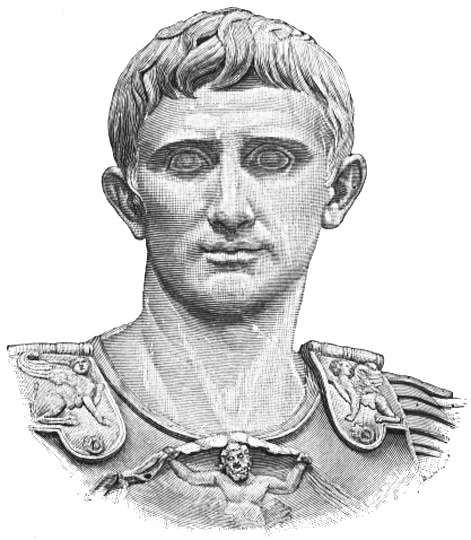Werk
Res gestae divi Augusti
AugustusAugustus Berühmte Zitate
„Habe ich meine Rolle gut gespielt? Nun so klatscht Beifall, und schickt uns alle freudig fort!“
(Vor-)Letzte Worte, 19. August 14 n.Chr., Häufiger Schlußsatz griechischer Schauspiele, Sueton: Divus Augustus 99, 1
Original griech.: "ἐπεὶ δὲ πάνυ καλῶς πέπαισται, δότε κρότον // καὶ πάντες ἡμας μετὰ χαρᾶς προπέμψατε."
lat.: "Acta est fabula, plaudite!"
„Eile langsam! Ein vorsichtiger ist besser als waghalsiger Heerführer.“
gemäß Sueton: Divus Augustus 25, 4
(Original griech.: "σπεῦδε βραδέως· ἀσφαλὴς γάρ ἐστ' ἀμείνων ἢ θρασὺς στρατηλάτης.")
Der erste Satz (sprich "speude bradeos") wurde sprichwörtlich, vornehmlich in der lateinischen Übersetzung "festina lente!".
Der zweite Satz stammt von Euripides, Die Phönizierinnen, 599.
„Livia, lebe in Erinnerung an unsere Ehe, und lebewohl!“
Letzte Worte zu seiner Frau, 19. August 14 n. Chr., Sueton: Divus Augustus 99, 1
Original lat.: "Livia, nostri coniugii memor vive, ac vale!" - la.wikisource http://la.wikisource.org/wiki/Vita_divi_Augusti
„Quintilius Varus, gib die Legionen zurück!“
nach der Schlacht im Teutoburger Wald, Sueton, Divus Augustus 23, 2
(Original lat.: "Quintili Vare, legiones redde!" - la.wikisource http://la.wikisource.org/wiki/Vita_divi_Augusti)
Oft zitiert als "Vare, Vare redde (mihi) legiones (meas)!".
„Was gut genug getan wurde, ist auch schnell genug getan.“
gemäß Sueton: Divus Augustus 25, 4
Original lat.: "sat celeriter fieri quidquid fiat satis bene." - la.wikisource. http://la.wikisource.org/wiki/Vita_divi_Augusti
gemäß Res gestae divi Augusti 26
Original lat.: "Gallias et Hispanias provincias, item Germaniam qua includit Oceanus a Gadibus ad ostium Albis fluminis pacavi." - :la:s:Res gestae
Augustus: Zitate auf Englisch
“I came to see a king, not a row of corpses.”
After having visited the mausoleum of Alexander the Great in Alexandria, Augustus was asked if he also wanted to visit the mausoleum of the Ptolemies; in Suetonius, Divus Augustus, paragraph 16. Translation: Robert Graves, 1957.
“Whatever is done well enough is done quickly enough.”
Sat celeriter fieri, quidquid fiat satis bene.
In Suetonius, Lives of the Twelve Caesars, II., 25.
Cf. Shakespeare, Macbeth I. vii, "If it were done when 'tis done, then 'twere well it were done quickly".
“Have I played the part well? Then applaud as I exit.”
Statement made as he was dying, as quoted in The Fall of the Roman Empire (2007) by Rita J. Markel, p. 126
“Ah, never to have married, and childless to have died!”
Quoting Homer's Iliad. Augustus was frequently disappointed in the conduct of his daughter Julia; in Suetonius, Divus Augustus, paragraph 65. Translation: Robert Graves, 1957.
“Goodbye, Livia; remember our marriage!”
Livia, nostri coniugii memor vive, ac vale!
Said to his wife Livia on his deathbed; in Suetonius, Divus Augustus, paragraph 99. Translation: Robert Graves, 1957.
From a speech regarding the morality laws of Lex Julia. Livy's account states the speech was plagiarized by Augustus from another by Q. Metellus (Periochae 59.9). A fragment of this original speech (quoted) is preserved by A. Gellius (Noctes Atticae 1.6).
Original: (la) Si sine uxore pati possemus, Quirites, omnes ea molestia careremus; set quoniam ita natura tradidit, ut nec cum illis satis commode, nec sine illis ullo modo vivi possit, saluti perpetuae potius quam brevi voluptati consulendum est.
Quelle: [http://www.unrv.com/government/julianmarri
“To seek to keep the established constitution unchanged argues a good citizen and a good man.”
Of Cato, as quoted in An Examination of the Isis Cult with Preliminary Exploration into New Testament Studies (2008) by Elizabeth A. McCabe
“Quintilius Varus, give me back my legions!”
Said of Publius Quinctilius Varus, who commanded the three legions lost at the Battle of the Teutoburg Forest; in Suetonius, Divus Augustus, paragraph 23. Translation: Robert Graves, 1957.
Postquam bis classe victus naves perdidit, Aliquando ut vincat, ludit assidue aleam.
A popular rhyme at the time of the Sicilian war, mocking Augustus' habit of playing dice; in Suetonius, Divus Augustus, paragraph 70. Translation: Robert Graves, 1957.
“The whole of Italy swore allegiance to me.”
Iuravit in mea verba tota Italia.
XXV, 3-4. Translation by Thomas Bushnell
Res Gestae Divi Augusti
“Behold them, conquerors of the world, the toga-clad race of Romans!”
En Romanos, rerum dominos, gentemque togatam!
Said disparagingly of a group of men in cloaks, quoting Virgil's The Aeneid. Augustus allowed only those wearing a toga and no cloak to enter the Forum; in Suetonius, Divus Augustus, paragraph 40. Translation: Robert Graves, 1957.
“My dear Tiberius, you must not give way to youthful emotion or take it to heart if anyone speaks ill of me; let us be satisfied if we can make people stop short at unkind words.”
Aetati tuae, mi Tiberi, noli in hac re indulgere et nimium indignari quemquam esse, qui de me male loquatur; satis est enim, si hoc habemus ne quis nobis male facere possit.
Suetonius, Divus Augustus, paragraph 51. Translation: Robert Graves, 1957.
Suetonius, Divus Augustus, paragraph 28.
The grain supply to the city of Rome was a contentious political issue; in Suetonius, Divus Augustus, paragraph 42. Translation: Robert Graves, 1957.
Referring to the faction of Marcus Antonius.
Res Gestae Divi Augusti
As quoted in Houghton, Mifflin, Familiar Short Sayings of Great Men (1882), p. 25
Variant translations: "Hurry slowly"; or, "Hasten slowly." Originally quoted in Greek, in Suetonius, II. Augustus, section 25, but better known in the Latin form, as reported in Chambers Dictionary of Quotations (1997), p. 50
Marcus Antonius, taunting Augustus for his conduct during the Sicilian war against Sextus Pompey in 36 BC; in Suetonius, Divus Augustus, paragraph 16. Translation: Robert Graves, 1957.
“He could boast that he inherited it brick and left it marble.”
Suetonius, of Augustus and the city of Rome, in Lives of the Caesars, Divus Augustus, XXVIII, 3.
“I found Rome a city of bricks and left it a city of marble.”
Marmoream relinquo, quam latericiam accepi.
Quoted in Svetonius, Lives of the Cesars, Aug., XXVIII, 3
